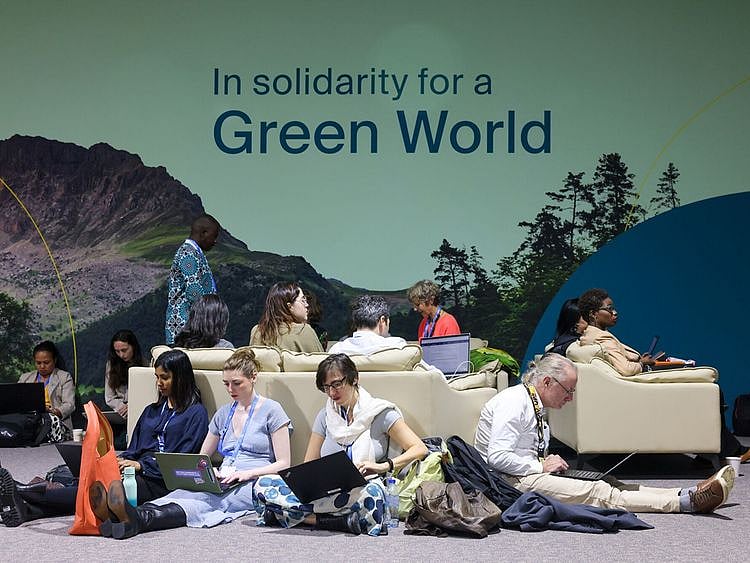COP29 exposes deep divides in climate action and global hypocrisy
COP29 in Baku sparks fierce debate over climate action and global inequalities

COP29 United Nations Climate Change Conference in Baku, Azerbaijan, has cast a stark spotlight on the deep divides in global climate politics. Azerbaijan’s President Ilham Aliyev did not hesitate to call out what he sees as the “hypocrisy” of Western nations, accusing them of double standards in addressing climate change. His remarks, though controversial, point to a persistent and underlying inequity that hampers real progress in climate negotiations.
Aliyev’s speech reflects the concerns of many developing nations that feel the burden of global climate responsibility has been unfairly placed on their shoulders. Historically, the world’s wealthier countries are the greatest emitters of greenhouse gases.
When these countries call for rapid emission reductions, they often fail to provide adequate support for poorer nations to make the same transition. Aliyev’s defence of fossil fuels and his critique of Western climate policies — though uncomfortable in climate discourse — serve as reminders of the socioeconomic complexities that make achieving equitable climate action challenging.
Aliyev’s critique of Western nations for demanding ambitious climate action while continuing to benefit from fossil fuels struck a chord with many developing nations. His remarks reflect a common frustration with Western countries that, after building their economies on fossil fuels, now push others to cut emissions without adequately addressing their own energy dependencies or providing the necessary financial support.
Historically high emissions
Aliyev’s comments remind us that the transition to renewable energy, while essential, is far from straightforward. For decades, wealthy nations have capitalised on fossil fuels to grow their economies, and now they are urging the rest of the world to change course without fully addressing their own contributions to the crisis. Nations with historically high emissions need to take decisive steps domestically before expecting others to follow suit.
Trump’s reelection as President of the United States raises serious doubts about the country’s commitment to climate treaties.
Aliyev defended fossil fuels as a “gift from God”. His arguments raise an important question: Who bears the responsibility for addressing climate change? Fossil fuels have historically fuelled economic growth and continue to power critical industries worldwide. For countries like Azerbaijan, whose economies rely heavily on fossil fuel exports, a sudden transition to renewable energy could bring severe economic and social consequences.
A major theme of COP29 has been climate finance, specifically the need for wealthier countries to support the green transitions of poorer nations. Developing countries require at least $1 trillion annually by 2030 to fund green energy and protect against climate impacts. However, this financial target, which could significantly address the global climate crisis, faces resistance from many Western countries. The United States, under the incoming Trump administration, is likely to withdraw from the Paris Agreement once again.
The 2015 Paris Agreement set a target of $100 billion per year in climate finance, a goal met only recently and primarily through loans rather than grants, which developing countries argue places undue burden on them. As COP29 unfolds, the aim is to establish a new, more ambitious funding target to support vulnerable nations. However, wealthy countries remain reluctant to contribute more.
A report from the Independent High-Level Expert Group on Climate Finance warns that failing to meet these financial commitments now will only make future climate action costlier. The report’s message is clear: If the world delays climate investment, it will face steeper economic and environmental costs in the years ahead.
Taxing polluting industries
In Baku, there have been proposals to fund climate initiatives by taxing polluting industries such as aviation, fossil fuels, and shipping. While this approach could provide a reliable revenue stream, it has met resistance, especially from Western nations wary of such measures.
The resistance to such proposals highlights an ongoing disconnect in global climate negotiations, as wealthier nations hesitate to make the bold changes needed to support global climate action.
If COP29 is to make meaningful progress, wealthier nations must step up and align their climate rhetoric with action. This means offering substantial financial assistance to developing countries to pursue sustainable development pathways.
Equally, it requires that fossil-fuel-dependent nations like Azerbaijan adopt transparent, actionable climate policies. Without both financial backing and transparent action, the climate crisis will only deepen, and inequities will continue to grow.
Aliyev’s critique of the West emphasises the need to address the inequities that currently stall climate progress. For climate summits to yield real results, the countries must confront these contradictions head-on. Wealthy nations, particularly those with a legacy of high emissions, must support policies that allow developing countries to adapt, diversify economically, and make the necessary green transition.
If COP29 is to be more than just another round of negotiations, it must prioritise robust climate finance, operationalise the Loss and Damage Fund, and ensure that every nation — wealthy or not — shares responsibility in a way that reflects their capacity and historical contributions.
COP29 stands as a reminder that climate justice is not just an ideal; it is essential to a sustainable and resilient future for all.
Network Links
GN StoreDownload our app
© Al Nisr Publishing LLC 2026. All rights reserved.